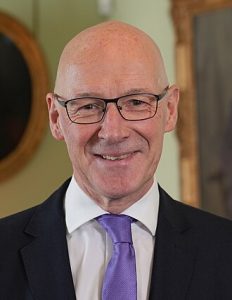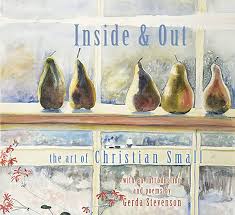
From wikipedia.org / © Simon Walker, HM Treasury
Now the dust has settled after the British general election on July 4th, it’s time to offer my tuppence worth about the result. This saw the Labour Party, led by Keir Starmer, brought to power for the first time in 14 years. It also saw the Conservative Party, under Rishi Sunak, take an ignominious and well-deserved humping and get booted out of government. They shed 244 seats in the Westminster parliament and ended up with just 121.
But first… A message for viewers in Scotland.
As (a) someone who’s believed for a long time that Scotland would ultimately be better off as an independent nation rather than as a region of Britain, and (b) a total pessimist, I wasn’t surprised at the dire election result for the Scottish National Party, where it ceded many seats in Scotland to Labour and went from having 43 seats to having a mere nine. As I said in a post a few weeks ago about the SNP’s new leader John Swinney – what a baptism in fire he’s had – “I suspect folk in Scotland are so scunnered by the SNP’s recent scandals and mishaps, and so desperate to see the back of the Tories, that they’ll vote for Labour en masse next month.”
The SNP having so few Scottish seats in parliament and Labour having so many – they’ve now got 37 in Scotland – isn’t something that thrills me. Scotland has lost some decent SNP representatives in London, for example, Alison Thewliss, John Nicholson, Tommy Shepherd and Alwyn Smith. To be fair, I have no idea what they were like as constituency MPs, but they impressed me with their capabilities and eloquence when I saw them speak in parliament.
Also, I’m old enough to remember the 1980s and 1990s – a period of almost continuous Conservative rule from London – when the Scottish seats were also packed with Labour MPs and, the joke went, in Glasgow you could stick a red rosette on a monkey and it’d get voted into Westminster. The old Scottish Labour contingent contained several heavyweights like John Smith, Donald Dewar, Alistair Darling, Robin Cook and Gordon Brown, and also a few mavericks like the admirable Dennis Canavan and the gruesome George Galloway. But the majority of those MPs were, for want of a better word, turnips.
As I wrote on this blog a few years ago: “I’m thinking of such specimens as Lanark and Hamilton East’s one-time Labour MP Jimmy Hood, who once declared he’d oppose Scottish independence even if it made the Scottish people better off – the fact that as an MP he was busy claiming £1000-a-month second-home expenses in London no doubt had something to do with his keenness to keep Westminster running the show. And Midlothian’s David Hamilton, who in 2015 did his bit for the battle against sexism by describing Nicola Sturgeon (and her hairstyle) as ‘the wee lassie with a tin helmet on’. And Glasgow South West’s Ian Davidson, who charmingly predicted that after 2014’s referendum on Scottish independence the debate would carry on only ‘in the sense there is a large number of wounded still to be bayoneted’. This shower became known as the ‘low-flying Jimmies’ because of their lack of ambition in anything other than being cannon-fodder for Labour at Westminster and enjoying all the perks that came with being MPs. And with numpties like these populating the Westminster opposition benches during the 1980s and 1990s, it’s no surprise Mrs Thatcher’s Tories had a free run to do whatever they liked in Scotland.”
It’s possible the new crop of Scottish Labour MPs will be more distinguished than their predecessors, but I’m not holding my breath. That’s especially since the two most famous ones are the self-important Douglas Alexander and Blair McDougall, head of the ‘no’ campaign before the 2014 Scottish independence referendum, who famously reassured worried Scottish voters that Boris Johnson had no chance of ever becoming British prime minister: “I think that Boris Johnson’s a clown… he’s not even an MP let alone Prime Minister at the moment.”

From wikipedia.org / © Lauren Hurley
Nor does it inspire confidence that new PM Keir Starmer has made Edinburgh Labour MP Ian Murray Secretary of State for Scotland. Murray is more hardline-Unionist than many of the Tories. When his predecessor as Scottish Secretary, Tory posho Alister Jack, was asked if a Conservative government would ever allow another referendum on Scottish independence, he mused that support for independence would have to be running at about 60% in opinion polls. When Murray was asked if there were any circumstances in which he’d allow a referendum, he curtly replied: “None whatsoever.”
Not that I think Labour’s hegemony in Scotland this time will last as long as it did previously (when it had the bulk of Scottish MPs until 2015). For one thing, the party situation and voting situation are now much too volatile. Scotland today has six parties competing in a first-past-the-post electoral system – Labour, the SNP, the Tories, the Liberal Democrats, the Greens and, unfortunately, Nigel Farage’s far-right-wing Reform Party. (I didn’t include Alex Salmond’s Alba Party in that list because they lost their deposit in every seat they contested.) And Labour’s share of the vote in Scotland last week was just 5.3% ahead of that of the SNP, so their position is hardly unassailable.
Anyway, onto the results for Britain generally. While I was delighted to see the Tories pulverized – and they thoroughly deserved to be pulverized, having presided over one of the most disastrous periods of government in British history, one that brought us austerity, Brexit, Prime Minister Boris ‘party during lockdown’ Johnson and Prime Minister Liz ‘crash the economy’ Truss – I have to say I’m worried. Starmer’s Labour Party won the lion’s share of the seats in parliament, but the votes cast for them were not that many – they received 9,731,363 votes, 33.8% of the total cast. That number is lower than those won by Starmer’s predecessor as Labour leader, the much-maligned Jeremy Corbyn, who managed 10,269,051 votes in 2019 and 12,877,918 votes in 2017. What saved Labour’s bacon this time was a low turn-out and the presence of Farage’s Reform Party, luring right-wing voters away from the Tories. If you add up the right-wing votes, those cast for the Conservative and Reform parties, they exceed Labour’s figures by more than a million votes and more than three percent of the vote-share.
Which is concerning, as I don’t think Starmer’s government is going to be popular for very long. Again, as I wrote last month, his party was “so obsessed with attracting former Conservative Party voters they’ve made their policies a continuation of the right-wing ones that’ve damned Britain to rack and ruin during the past 14 years. For instance, they’ve vowed not to revisit the terms of the Tories’ Brexit arrangement with the European Union, even though it’s hobbled British businesses and it’ll thwart their plans to ‘grow’ the economy; and they won’t countenance raising taxes, which makes you wonder how they’re ever going to lift Britain’s public services out of their current, dire state.”
Meanwhile, looking at what’s left of the Tory Party, I see that its surviving MPs include that self-promoting, hard-right-wing trio Priti Patel, Suella Braverman and Kemi Badenoch. As MPs, and with Rishi Sunak on his way out, they’ll be able to run for the party leadership. I can see one of them winning, swinging the Tories even further to the right and cutting a deal with Farage before the next election, probably in 2029. Farage is the favourite British politician of both Vladimir Putin and Donald Trump, so I’m sure lots of foreign money would mysteriously arrive to ‘grease’ such an arrangement.

© BBC
Oh well. You have to take your pleasures when you can, and there was much to enjoy on election night, when various Tory politicians I didn’t like lost their seats. I shed no tears, for instance, when Penny Mordaunt got the boot in Portsmouth. Another self-promoter, she’s always annoyed me with her jolly-hockey-sticks brand of patriotism and it confounded me how, for a while last year, she was hero-worshipped for carrying a big sword, whilst wrapped in patterned blue wallpaper, at a ridiculous Ruritanian ceremony in Westminster Abbey. Mind you, she was talked about as potential future leadership material, and was a moderate by Tory standards, so she might have prevented the party from veering off into Farage-land if she’d kept her seat.
I was also tremendously cheered by the departures of that preposterous, top-hatted, Victorian undertaker Jacob Rees-Mogg in Somerset; the braying, bearded bovver-boy Jonathan Gullis in Stoke; the middle-finger-raising Andrea Jenkyns in Yorkshire; the absurdly-coiffured Boris-Johnson cosplayer Michael Fabricant in Lichfield; and Liam Fox, Grant Shapps, Thérèse Coffey, Johnny Mercer, Gilliam Keegan… Oh, how I laughed.
Incidentally, on the non-Tory front, it was also fun to see the afore-mentioned gruesomeness that is George Galloway usurped from his seat in Rochdale, just four months after he’d won it in a by-election.
Obviously, the best result was the one that ended Liz Truss’s tenure as MP for South West Norfolk. The shortest-lasting Prime Minister ever – she managed only 44 days in office, easily beating the previous record set in 1827 by George Canning (who at least had the excuse of dying after 119 days as PM) – Truss has spent her time since showing not one ounce of contrition for her brief but disastrous reign, during which her plan to bring in massive tax cuts and pay for them by increasing government borrowing resulted in the pound plummeting, banks and building societies pulling 40% of their mortgage products off the market, and 30 billion pounds getting added to the British Treasury’s fiscal hole, effectively doubling it. Far from it. Truss has been blaming everyone but herself. She’s even accused a beastly ‘anti-growth coalition’ and woke ‘deep state’ of sabotaging her premiership. Meanwhile, she’s also been ingratiating herself with the American far-right and cheerleading for Donald Trump. I do hope July 4th’s result terminates her political career, as her industrial-scale arrogance, incompetence and lack of self-awareness are getting a bit terrifying.

From wikipedia.org / © Simon Dawson
Finally, I was pleased to see the Green Party win four seats – just one seat less than Farage’s mob, who secured five. Does this mean the British media, including the BBC, will now be giving them nearly as much coverage as they give Farage? Don’t bet your life savings on it.



